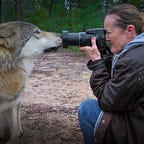First, Be A Good Animal
First be a good animal. — Ralph Waldo Emerson
What makes a “good” animal? The descriptive “good” is highly subjective, so let’s start with successful.
First, be a successful animal.
But how to define successful?
That’s personal and unique too. For me, it goes something like this. My current state is that of a human primate in 2017. I need to have my basic needs met like any other animal. I need food, shelter, and the ability to protect myself and my loved ones.
Once those basic needs are met, I have emotional and spiritual needs. When these are met, I am a happy animal. And this is one way I measure my success.
Once the basic needs are comfortably met, it has little to do with income and circumstance.
When I consciously monitor my condition — maintaining a homeostasis in which my self-esteem and personal values are solid and congruent with the choices I make for daily living — within the world, consuming, producing, and within interpersonal relationships, I am indeed a happy, successful animal.
In the wild, what makes a successful animal?
Survival.
Survival of the individual. Passing the DNA to offspring. Continuation of the species.
As a human city-dwelling ape in 2017, the environmental variables in my life differ from those of my brother and sister animals around the world — other species.
Given the circumstances, can I use my primal instincts and skills I would need in the wild, to help me be a better human and global citizen?
Of course.
Because Emerson was right, in order to be a good human, I can’t bypass being a good animal.
Let’s examine a few traits and behaviors.
Environmental awareness — Mindful presence and examination of ourselves, our responses to situations, people, the taste of Key Lime Pie…all of this can improve our emotional and spiritual health, and our relationships.
Our quality of life is higher when we understand our own emotional responses, when we can learn and grow, when we pay attention to how we treat others. Conscious attention to detail in the moment does this, whether one is hunting for food in the wild, listening for the sounds of a predator, or in our case, looking into the eyes of a spouse and speaking as they walk through the door at the end of the day.
It matters. Be a good animal. Pay attention.
In the wild, if we operate in the autopilot mode that is so common on our streets and in our office cubicles, we are dead.
And if we operate the same way within our relationships or our jobs, these things can die — quickly — or through a slow, monotonous, torturous process.
Contrarily, if we choose to notice and appreciate the outputs of our senses, it can feel like time slows down for us. A moment can seem like it has expanded. Gratitude does that. In those moments of awareness, we are actually living.
And when we make this choice to actually live, it is the quality of life that becomes meaningful, rather than the length.
Learning from mistakes — Let me ask you — how long do you think an animal would survive in the wild if it didn’t hone its hunting skills and protective skills and pass this information to offspring?
While this certainly applies to meeting our basic needs in 2017, it can also apply to the quality of our lives by impacting personal relationships. Do we really improve the quality of them if we just mindlessly respond to stimuli, never learning, repeating the same mistakes over and over, relationship after relationship?
Be a good animal.
Another way to be a good animal in 2017 is by utilizing our evolved prefrontal cortex for the complex decision making for which nature designed it. Human apes — at least some of us — can understand their impact on other species, and on their environment.
We can use higher reasoning to implement strategies that perpetuate our species by protecting the interconnected web of life.
We can understand that we are but one animal, and that if we take too much, too often, we do damage for which our own species will ultimately pay a heavy price.
Many animals survive by protecting their groups, their packs, their troops, their families. The needs of the group are important. There are rules, sometimes hierarchies, rituals, and an order to the way many things are done in order to assure survival.
I’m an INTJ. So rules have to make sense or I’ll throw them out with rapidity and force. That being said, when they make sense, I will use them to enhance my quality of life.
That’s a learned skill and happiness hack.
Although we may like to think of ourselves as set apart from other animals, we aren’t. Considering the needs of our loved ones, and even of those more distanced from us, can also serve our own needs. Whether it is a highly intimate relationship that contributes directly to our quality and enjoyment of life, or a more distant relationship, it serves us to be a good animal by caring about others.
As individualistic as many of us consider ourselves to be, we do need other human apes in order to survive.
And we need other animals.
Animals can remind us and teach us about our buried primal instincts — our need to promote the welfare of those dear to us.
Please continue to join me on this wildlife & conservation journey!
And by all means, first and foremost, BE A GOOD ANIMAL.
May you each be blessed and happy.
